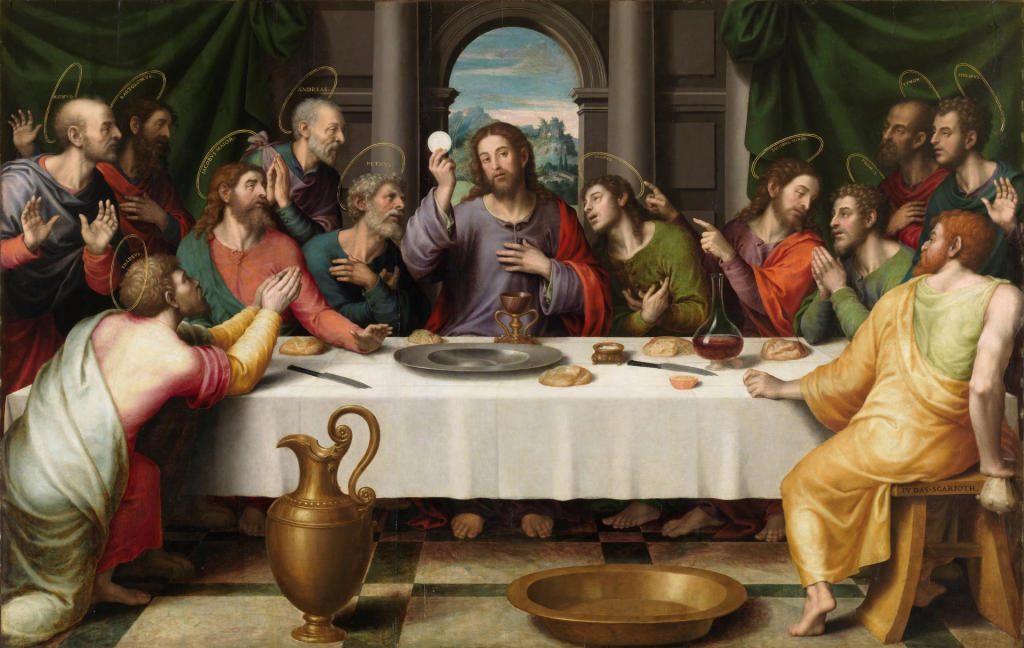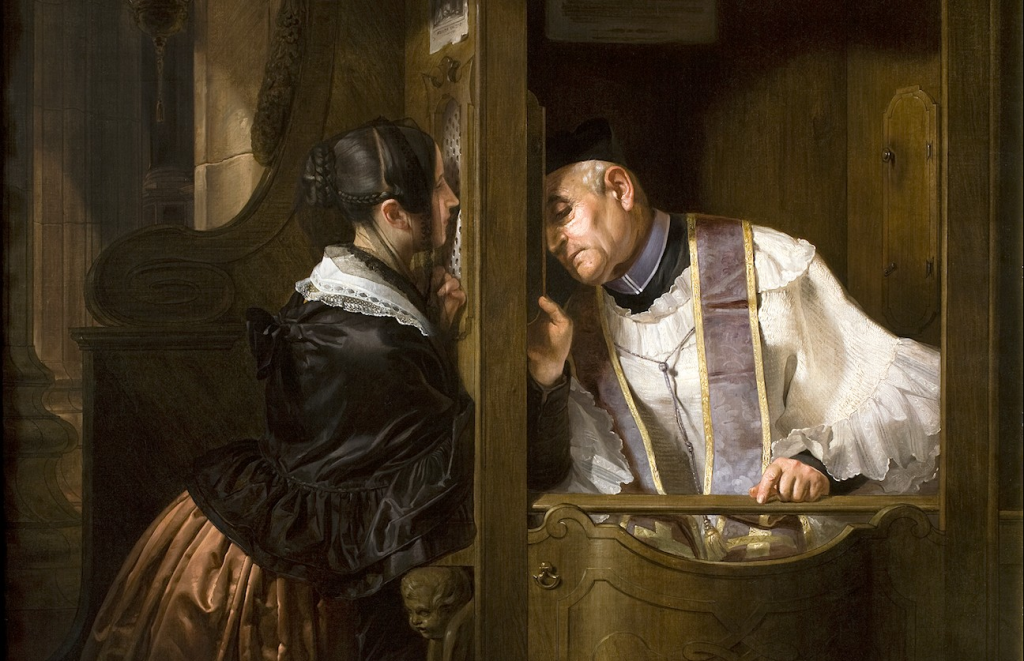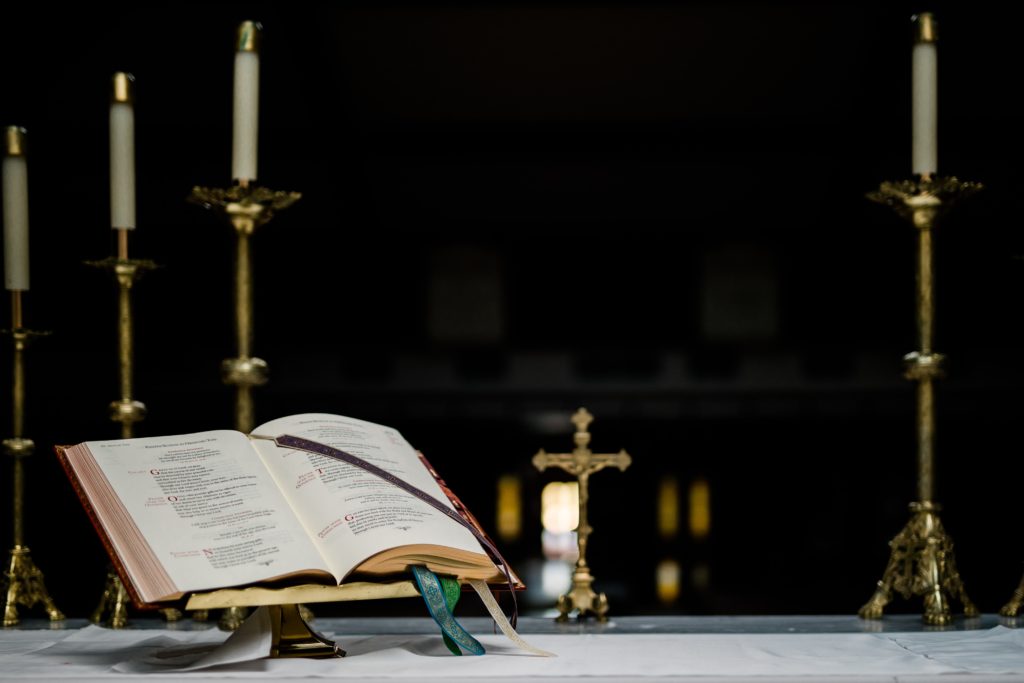This article will explore the three types of sacraments of the Catholic Church, illuminating how each sacrament concretely shapes Christian identity and empowers the faithful to embody Christ at every phase of the spiritual journey.
These three categories of sacraments organize the seven sacraments based on their role in Christian life and discipleship.
The 3 types of Sacraments of the Catholic Church are: (1) the Sacraments of Initiation, (2) the Sacraments of Healing, and (3) the Sacraments of Service.
The 3 Categories of Sacraments of the Catholic Church:
(1) The Sacraments of Christian Initiation
- Baptism
- Confirmation
- Eucharist
(2) The Sacraments of Healing
- Penance/Reconciliation
- Anointing of the Sick
(3) The Sacraments at the Service of Communion (& the Mission of the Faithful)
- Matrimony
- Holy Orders
All 3 types of Sacraments Instituted by Christ
Christ instituted all seven Sacraments of the Catholic Church, which touch “all the stages and all the important moments of Christian life: they give birth and increase, healing and mission to the Christian’s life of faith” (CCC 1210).
The sacraments have their origin and foundation in Christ, who established these sacred rituals through His saving work and the commission given to His apostles. As the Catechism affirms, the sacraments are “powers that come forth” from the Body of Christ and provide grace that brings forth the life of Christ in those who receive them with faith (CCC 1116).

Jesus instituted the sacraments as tangible actions that confer the grace won through His passion, death, and resurrection. Each sacrament connects to some aspect of Christ’s ministry – his miracles, teachings, and final commands to His disciples. For example, Baptism echoes Christ’s own baptism, the Eucharist fulfills His words instituting it at the Last Supper, and Reconciliation embodies His mercy and authority to forgive sins.
As mentioned in the Catechism of the Catholic Church, these seven Sacraments can be placed in and even received in various orders (with the primary exception being Baptism, which must come first), but the order mentioned above bears testimony to the fact that the seven Sacraments together constitute an organic whole (CCC 1211). There is an integral unity among the sacraments, as each is a participation in the one redemptive work of Christ made present through visible signs.
The Sacraments of Christian Initiation
The Sacraments of Baptism, Confirmation, & Eucharist are called the Sacraments of Christian Initiation because upon receiving all three one becomes a full member of the Body of Christ and the Catholic Church.
The proper order of reception of these Sacraments are the following: (1) Baptism, (2) Confirmation, & (3) Eucharist. This reflects the original practice of the early Church, where new converts would receive all three sacraments of initiation in immediate succession at the Easter Vigil as they entered the Church.

With that being said, it has become common practice in the western world to receive the Sacrament of Eucharist prior to receiving the Sacrament of Confirmation. However, this practice is due to historical and cultural developments connected to the Sacrament of Confirmation.
In the early Middle Ages, the bishop was the ordinary minister of Confirmation and did not always make regular visits to parishes for confirmations. The order of the sacraments became reversed over several centuries.
If you’re interested in a very good and thorough commentary on the history of what led to the Sacrament of Confirmation being received after the Sacrament of Eucharist, you can read Archbishop Samuel J. Aquila’s address from 2013 on his desire to restore the order of the sacraments within his own diocese (Denver).
To sum up the Sacraments of Initiation, the Catechism states: “The faithful are born anew by Baptism, strengthened by the sacrament of Confirmation, and receive in the Eucharist the food of eternal life” (CCC 1212). Together, these sacraments initiate believers into the fullness of the Christian life in the Church.
RELATED: How to Explain the Trinity in 4 Steps
The Sacraments of Healing
According to the Catechism, the Sacraments of Penance/Reconciliation and Anointing of the Sick were instituted by Christ, the physician of our souls and bodies, in order that the Church could continue his work of healing and salvation in the world (CCC 1421).
RELATED: 7 Powerful Prayers Before Confession
The Sacrament of Penance/Reconciliation is the sacrament in which the faithful “obtain pardon from God’s mercy for the offense committed against him, and… at the same time, [are] reconciled with the Church which they have wounded by their sins” (CCC 1422).

Many wonder why this sacrament is even necessary if Baptism already washes away the sins of the individual. The Church states that it is because Baptism “has not abolished the frailty and weakness of human nature, nor the inclination to sin that tradition calls concupiscence, which remains in the baptized such that with the help of the grace of Christ they may prove themselves in the struggle of Christian life” (CCC 1426).
In other words, the Church recognizes that Baptism doesn’t remove the tendency of the faithful to commit sin and that only with the help of God’s grace can one eventually overcome sin. Since overcoming sin doesn’t happen overnight, the Sacrament of Penance/Reconciliation both forgives the person when they fall and strengthens them to not fall again through the grace conferred. It provides ongoing spiritual healing as believers struggle against sin.
RELATED: 5 Prayers After Confession
The Sacrament of Anointing of the Sick is the sacrament in which “the whole Church commends those who are ill to the suffering and glorified Lord, that he may raise them up and save them” (CCC 1499).

This sacrament has many effects (CCC 1520-1523), including:
(1) Giving a special gift of the Holy Spirit which provides strength, peace, and courage to the Christian,
(2) Creating a special union with the passion of Christ,
(3) Granting an ecclesial grace uniting the Christian more deeply to the Church, and
(4) Providing the grace needed to prepare the Christian for their final journey to the Father’s House.
Often, the Anointing of the Sick is given to persons nearing the end of their life in the context of what the Church calls Viaticum (meaning, “provision for a journey”), which is when the Christian receives the Sacraments of Penance/Reconciliation, Anointing of the Sick, and Eucharist all at the same time to prepare them for their passage into eternal life.
The Sacraments at the Service of Communion (& the Mission of the Faithful)
The Sacraments of Matrimony and Holy Orders are unique in that they’re not primarily directed at the salvation of the one receiving the sacrament, but instead are directed at the salvation of others.
Meaning, these sacraments are for the good of the Church and for building up the Body of Christ. They are mission oriented.
Often these sacraments are associated with discernment by members of the faithful as they do their best to align their desires with the mission that God is calling them to in their life.
The Sacrament of Matrimony is a marriage covenant that is made between one man and one woman, which establishes “a partnership of the whole of life… [and is] ordered toward the good of the spouses and the procreation and education of offspring” (CCC 1601).
The marriage of a couple is not primarily for their own happiness, but is for the eternal happiness of others.

First and foremost, by God’s grace, the Sacrament of Matrimony is meant to establish a union between spouses that reflects the union of Christ and his Church.
In a marriage lived according to God’s plan, the love of God for his Church is revealed in the love of the spouses for one another.
As stated by the Church, “[the Sacrament of] Holy Orders is the sacrament through which the mission entrusted by Christ to his apostles continues to be exercised in the Church until the end of time: thus it is the sacrament of apostolic ministry” (CCC 1536).
There are three degrees to this Sacrament: (1) the episcopate (bishop), (2) presbyterate (priest), and (3) diaconate (deacon).
Though all believers participate in the one priesthood of Christ through Baptism, reception of the Sacrament of Holy Orders uniquely enables one to participate in the ministerial priesthood of Christ.
This sacrament is the only sacrament that is able to be received by men alone.

The Church explains that “the Lord Jesus chose men to form the college of the twelve apostles, and the apostles did the same when they chose collaborators to succeed them in their ministry… The Church recognizes herself to be bound by this choice made by the Lord himself” (CCC 1577).
Therefore, when it comes to the question of the ordination of women, it is not a question of permissibility but possibility.
My Favorite Books on the 3 Types of Sacraments of the Catholic Church
Sacraments in Scripture by Tim Gray
-An overview of the Sacraments of the Catholic Church and their scriptural basis.
Swear to God: The Promise and Power of the Sacraments by Scott Hahn
-An overview of the Sacraments of the Catholic Church and their connection God’s covenants throughout Salvation History.
The Lamb’s Supper: The Mass as Heaven on Earth by Scott Hahn
-An amazing introduction to what goes on at every Mass even though we so often miss it. This book changed my life!
Jesus and the Jewish Roots of the Eucharist: Unlocking the Secrets of the Last Supper by Brant Pitre
-The best book that I’ve read explaining the beauty of the Eucharist in Scripture. You will want to read this if you like learning about biblical typology.
Lord, Have Mercy: The Healing Power of Confession by Scott Hahn
-An introductory explanation of the Sacrament of Reconciliation why confessing our sins to a priest is such a gift.
Three to Get Married by Fulton J. Sheen
-A challenging, yet beautiful reflection on the Sacrament of Matrimony. This book was written much longer ago than the others above, but everything Fulton Sheen writes is absolutely moving. I buy this book as a wedding gift for every couple I know.
Did you know about the 3 categories of Sacraments before this article?
Let me know below in the comment box!

In this FREE guide, you’ll discover:
>> The 12 habits practiced by the saints to grow in holiness
>> What virtues are and why they matter in the pursuit of holiness
>> How focusing on one habit a month can transform your spiritual life
This guide breaks down the path to sainthood into 12 attainable habits you can start growing today. Learn from the saints and transform your spiritual life!

